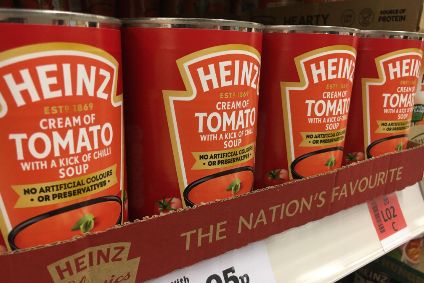
Kraft Heinz, ahead of a long-awaited investor conference, today (15 September) set out the scale of savings the US giant believes can be found as part of its “transformation plan”.
The baked beans, cheese and soup maker said it is “targeting” around US$2bn of what the company called “gross productivity efficiencies” to offset inflation and help fund investment in projects to grow the business.

Discover B2B Marketing That Performs
Combine business intelligence and editorial excellence to reach engaged professionals across 36 leading media platforms.
CEO Miguel Patricio, appointed in April 2019, is embarking on a new strategy to try to inject consistent growth into Kraft Heinz. The company said it is now managing its portfolio through “six consumer-driven platforms”, rather than “more than 55 individual categories”.
“I am extremely confident that unlocking the power of scale with agility, combined with our new operating model, will return Kraft Heinz to consistent and sustainable growth,” Kraft Heinz CEO Miguel Patricio said in a statement released ahead of the investor event. “We are placing the consumer at the centre of everything we do, leveraging our greatest assets, strengthening our partnerships, generating fuel that funds growth investments like our 30% increase in marketing spend, and creating a clear path to rebuilding Kraft Heinz into the industry leader we have the potential to become.”
Kraft Heinz’s financial performance has been in the spotlight in recent years. During 2019, Kraft Heinz ran up impairment charges of just shy of $1.2bn, which came on the back of a further $15.4bn writedown in goodwill, booked with the company’s results for 2018.
The Nasdaq-listed business has also been criticised for a lack of innovation – which Patricio has pledged to address – and to bring new momentum behind what many consider to be a host of legacy brands.

US Tariffs are shifting - will you react or anticipate?
Don’t let policy changes catch you off guard. Stay proactive with real-time data and expert analysis.
By GlobalDataIn 2019, Kraft Heinz saw its net sales fall by almost 5%, hit in part by disposals and exchange rates but sales were still down 1.7% on an organic basis. The company’s net income of $1.94bn contrasted with a 2018 net loss of $10.19bn but the comparison was skewed by the massive goodwill charge. Kraft Heinz’s “adjusted EBITDA” was down year-on-year.
Covid-19 has been an unexpected fillip to the Heinz ketchup and Oscar Mayer meats owner, as before the onset of the crisis, the company had expected sales to decline in organic terms in its first quarter through March.
In July, the Plasmon baby-food owner booked a fresh set of impairment charges alongside a set of half-year results that included higher sales and underlying earnings.
In the six months to 27 June, Kraft Heinz grew its net sales on an organic basis by 6.9%. Sales rose in the US, in Canada and from Kraft Heinz’s third reporting unit for “international markets”. In the second quarter, Kraft Heinz’s sales were 7.4% higher on an organic basis.
Reported half-year net sales stood at $12.81bn, up 3.6% on the first six months of 2019.
The impairment charges hit Kraft Heinz’s profits on a reported basis, with the Planters nuts maker booking a six-month operating loss of $569m and a net loss of $1.27bn.
However, the company provided a figure for first-half “adjusted EBITDA” of $3.2bn, which compared to $3.03bn a year earlier.
Kraft Heinz said today it expects its third-quarter net sales to rise at a “mid-single-digit” rate on an organic basis.
Ahead of the investor event, the group also set a “long-term” target for its annual organic net sales to rise by 1-2% and for its adjusted EBITDA to grow 2-3%.





